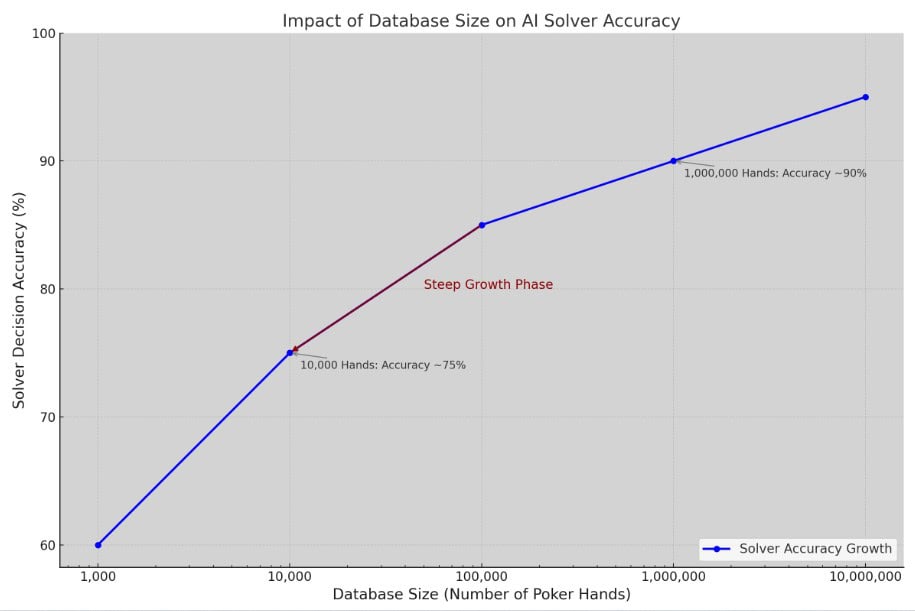
How Poker AI Databases Boost Your Win Rate
Ever wonder how some poker players seem to know what their opponent will do before they even do it? Well, it isn’t luck; many use advanced poker AI solvers. But here is the rub: their effectiveness is highly dependent on the size of their databases. Let’s explore why a bigger database can be your ace in the hole and how it’s reshaping the way poker is played.
The Role of Data in Poker AI Solvers
Try to imagine learning about all of poker by watching a few games. It would mean that most of the strategies and situations that come up would go over one’s head. Similarly, large data is what poker AI solvers thrive on. The more hands they analyze, the better they get at predicting what will happen and advising on the best course of action—a seasoned pro whispering in your ear on every single hand.

But how is this done in reality? AI solvers make an educated guess by using their databases to play out games. Each hand incorporated into the database makes the solver an increasingly knowledgeable tool regarding probabilities, player tendencies, and the effectiveness of certain strategies. Without solid data, not even the smartest algorithm can yield accurate recommendations.
Why Larger Databases Matter
Consider every hand of poker you play as a bit of a different puzzle. Without a solid database, there may be limited ability to discern patterns or make proper predictions. Conversely, if you have millions of hands to reference, your AI will have a great chance of noticing subtle trends and strategies that will give you a big advantage over your opponents.
Here’s a fitting example: consider a pocket dictionary vs. a full-scale encyclopedia. Sure, you can define most of the basics in a pocket dictionary, but any words that require depth or explanation will be lacking. In poker, that is the difference between breaking even and actually taking a decent profit.

Large databases also enable solvers to deal with edge cases—some rare events that can’t be solved by less-advanced systems. Whether it’s a highly aggressive opponent or navigating a tricky bluff, if there’s an AI that supports such a database, it’s ready for nearly anything that might come your way.
Training Algorithms on Extensive Data
AIs learn best by example. The more poker hands they’re fed, the more they can pick up on the subtlety of the game—most from frequent betting patterns to the rarest bluffs. Such extensive training now enables AI to provide insight on how to tune up your strategy for improved results at the table.
Just consider poker bots DeepStack and Libratus, each with phenomenal results in poker tournaments—not because they are “smarter” than the human player, simply because they had played through enormous data sets of hands. In fact, that training gave them something every poker player wishes he could master: adjusting in real time to new dynamics.
Impact on Strategic Decision-Making
A well-fed AI doesn’t spew data; it synthesizes information to offer actionable advice. Large databases enable the AI to recommend strategies against particular opponents or situations in the game to further improve your decision-making. That is like having a personal coach who knows every trick in the book.
Consider the example of playing against an opponent who loves to raise on the river. You’d be guessing in your mind what he did and why without the AI. Now, with a strong solver, you can easily learn in a very short span of time if that person is on a typical bluff or value bet given that size. Not only is that helpful—that is game-changing.
Removing Mistakes and Building Confidence
Poker is the kind of game where just a single small mistake might cost you dearly. More information helps you minimize mistakes by better framing your decisions, which in turn adds more accuracy and can give you the confidence to finally make that one bold move at the right time.
For instance, consider being on the brink of a decision, say, when to call an opponent’s all-in bet. A highly data-capable solver analyzes it within a moment and prescribes the best course of action, having huge data from the hands that have already been played. That could be the difference between folding too early and taking down a huge pot.
Changing Strategies According to Opponents
Poker is just as much about the opponents as it is about the cards. A well-maintained database means inclusion of different playing styles, thus allowing the solver to anticipate various strategies. Be it a tight player or a loose cannon, your AI has got your back.
We should not forget that poker is a game in evolution. Players adapt, new trends create themselves, and strategies that worked yesterday might fail today. Here’s where the regular update for your solver’s database becomes important. In competitive poker, being ahead of the curve is not a luxury, it’s a must.
Real-World Applications and Success Stories

Behold Libratus, the AI poker bot from Carnegie Mellon University. In 2017, he beat the best human players in head-up, no-limit Texas hold’em due to his better algorithms and big database. How he could adapt his strategy from the big pool of scenarios was the critical difference maker.
Beyond the major tournaments, everyday players bring AI into their poker skill set. Apps and software for personal use boast solver capabilities, making professional insights available to the many. Which brings up some practical steps to enhance one’s poker AI experience:
- Investing in quality data to enable AI solvers to offer in-depth views in the database of poker hands.
- Keeping the database current because poker is an ever-changing environment, which means staying up-to-date with newly developed trends and tactics.
- Analyzing and learning by taking that insight AI provides and working on fine-tuning one’s game, turning those weaknesses into strengths.
- Experimentation not just using the AI but understanding how recommendations play to personal style in real games.
Knowledge, then, is truly power in online poker. With huge databases of poker AI solvers that let the AI analyze, adapt, and advise in real time, you’re giving yourself an edge with a tool that analyzes, adapts, and advises in real time. Be you an old pro or a newbie, heed this: the size of your AI’s database may well be what lets you unlock your complete capability at the poker table. So every time you sit down to play, make sure your AI has done its homework, because winning isn’t about the cards—it’s about playing smarter.
